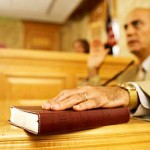 In late January the “tort reform” package imposed the staid Daubert rules on the Wisconsin Rules of Evidence. Now it’s spring, although the weather feels a lot like January, and we must get serious about what to do with this gift that the judiciary did not want. The new rules require that expert testimony be based on demonstrably reliable methods and principles. To be determined is whether Wisconsin will be a “strict” or a “lax” Daubert jurisdiction — whatever that is. It is worth noting that the first wave of Wisconsin Daubert cases, which will likely set the mold for what follows, are also those that least interested the tort reformers, namely, criminal cases and “chapter 980” sexually violent offender cases.
In late January the “tort reform” package imposed the staid Daubert rules on the Wisconsin Rules of Evidence. Now it’s spring, although the weather feels a lot like January, and we must get serious about what to do with this gift that the judiciary did not want. The new rules require that expert testimony be based on demonstrably reliable methods and principles. To be determined is whether Wisconsin will be a “strict” or a “lax” Daubert jurisdiction — whatever that is. It is worth noting that the first wave of Wisconsin Daubert cases, which will likely set the mold for what follows, are also those that least interested the tort reformers, namely, criminal cases and “chapter 980” sexually violent offender cases.
Right now, however, we are in a state of nature, legally speaking. Case law under the relevancy test, the current standard, is of little avail. And while the new rules are copied from the federal rules, state courts are not bound by federal precedent (yes, that includes Daubert itself!). Last week alone I spoke at two conferences, one a large, attentive gathering of state judges in Elkhart Lake and the other an even larger, equally engaged joint convocation of state prosecutors, public defenders, and private defense counsel here at Eckstein Hall. There is a clamor for answers and a discernable unease about what to do.
In both settings I greatly benefited from my participation on a panel just a week earlier on April 7, 2011 at the annual meeting of the Eastern District of Wisconsin Bar Association in Milwaukee. The panel was entitled “Daubert Today: A Standard for All Wisconsin Courts.” Organized by Matthew W. O’Neill (of Friebert Finerty & St. John) and moderated by Dean Joseph D. Kearney of Marquette Law School, the panel also consisted of two seasoned federal civil litigators and two federal judges (and me). Let me briefly summarize some of their more salient points.
Ralph A. Weber, a Marquette adjunct professor and partner in Gass Weber Mullins LLC, sees the new rules as a substantial improvement over the “trial-friendly” rules that preceded them precisely because they empower trial judges to exclude unreliable expert testimony. Ralph hopes that trial lawyers and trial judges take the new rules seriously, suggesting that evidentiary hearings and even expert witnesses on reliable methodologies may be in order. One problem, though, is that the state legislature did not mandate that expert witnesses submit reports that conform with Fed. R. Civ. Pro. 26, which is designed to foster Daubert scrutiny.
My Marquette colleague Rick Esenberg (formerly of Foley & Lardner), also an experienced civil litigator, thoughtfully underscored the contingency of the new rules. Rick noted that their effect on litigation is dependent (“it depends”) on a variety of factors, including especially Wisconsin’s “trial friendly” legal culture. Old habits are hard to break. Moreover, state judges simply do not have the resources available to federal courts when closely scrutinizing expert opinion testimony. Rick also brought up the proscription against ipse dixit (“because he said so”) testimony, the bane of the Seventh Circuit, whereby parties offer well-credentialed witnesses who rely more on inflated (my word) resumes than tested methodologies or proven protocols.
We then turned from the panel’s lawyers to the judges. Judge Rudolph T. Randa, a federal district judge with substantial state judicial experience as well, also addressed the ipse dixit problem, noting the Seventh Circuit’s close scrutiny of such testimony and that some lawyers blur relevancy concerns (the “4s” in the FREs) with the assistance standard (the “7s”). Acknowledging that much of Daubert lore is caught up in how to establish reliable methods, etc., Judge Randa emphasized the equally significant problems that arise when expert witnesses are ignorant of the underlying facts of the case.
Finally, federal magistrate judge William E. Callahan, Jr., spoke of the numerous Daubert challenges he has confronted over the years. Judge Callahan emphasized that nothing in the Daubert case law, or the rules themselves, require an evidentiary hearing. Nonetheless, they are difficult motions that require study by the judge, so counsel should consider pretrial motions, which may be based on “paper” (e.g., dueling affidavits, depositions, expert reports). Judge Callahan forecasts that Wisconsin trial judges will conduct more pretrial hearings on experts than they did under prior practice, especially in connection with summary judgment motions and in the absence of a Rule 26-type reporting requirement. Finally, he cautioned against the overuse of expert witnesses, reminding those in attendance that not all such witnesses provide meaningful assistance to the court.
